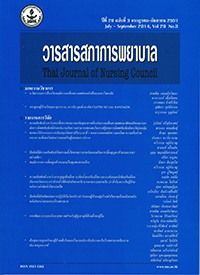พฤติกรรมการเลี้ยงลูกด้วยนมแม่ในชุมชนชานเมือง
Keywords:
การศึกษาเชิงคุณภาพ พฤติกรรมการเลี้ยงลูกด้วยนมแม่ การเลี้ยงลูกด้วยนมแม่อย่างเดียว ชุมชนชานเมือง, qualitative study, breastfeeding behaviour, using breastfeeding as the only means of feeding babies, suburban communityAbstract
บทคัดย่อ: วัตถุประสงค์ของการวิจัย: เพื่อวิเคราะห์สถานการณ์และเข้าใจพฤติกรรมการเลี้ยงลูกด้วยนมแม่ของมารดาในชุมชนชานเมืองในจังหวัดนครปฐม
การออกแบบวิจัย: การวิจัยเชิงคุณภาพ (Qualitative research)
วิธีดำเนินการวิจัย: ผู้ให้ข้อมูลเป็นมารดาที่มีบุตรอายุเก้าวัน ถึง 4 ปี อายุระหว่าง 17-35 ปี จำนวน 11 ราย เก็บรวบรวมข้อมูลโดยการสัมภาษณ์เชิงลึกตามแนวคำถามที่กำหนดไว้ ที่บ้านของผู้ให้ข้อมูลโดยผู้วิจัยหลัก อัดเสียงและถอดเทปแบบคำต่อคำ วิเคราะห์ข้อมูลโดยวิธีวิเคราะห์เชิงเนื้อหา
ผลการวิจัย: พบว่าพฤติกรรมการเลี้ยงลูกด้วยนมแม่แบ่งเป็น 2 ลักษณะ 1) มารดาเลี้ยงลูกด้วยนมแม่พร้อมกับการให้น้ำ เป็นระยะเวลาสั้นๆ 2-3 เดือน หลังจากนั้นกลับไปทำงาน โดยให้นมผสม น้ำ และอาหารเสริม 2) มารดาเลี้ยงลูกด้วยนมแม่อย่างเดียวได้นาน 3-4 เดือน จึงเริ่มให้น้ำ นมผสม หรืออาหารเสริม และยังคงให้นมแม่ต่อไปจนลูกอายุ 1-4 ขวบ ผลการศึกษาแสดงให้เห็นว่าไม่มีมารดารายใดสามารถเลี้ยงลูกด้วยนมแม่อย่างเดียวได้นาน 6 เดือน ตามคำแนะนำขององค์การอนามัยโลกและกระทรวงสาธารณสุข เนื่องจาก ต้องออกไปทำงาน น้ำนมไม่พอ กลัวว่าลูกจะติดนมแม่ทำให้เลิกยาก
ข้อเสนอแนะ: พยาบาลในหน่วยสูติกรรมควรมีการจัดทำแนวปฏิบัติในการให้ความรู้และความช่วยเหลือเรื่องการเลี้ยงลูกด้วยนมแม่แก่มารดาทุกรายให้เป็นไปในแนวทางเดียวกัน เพื่อช่วยให้มารดาสามารถเลี้ยงลูกด้วยนมแม่ได้ก่อนกลับบ้าน และควรติดตามเยี่ยมมารดาหลังคลอดเพื่อให้ความรู้หรือการช่วยเหลือเพิ่มเติมโดยเฉพาะแม่ทำงาน
Abstract
Breastfeeding Behaviour in a Suburban Community
Objective:
To analyse the breastfeeding situation and understand mothers’ breastfeeding behaviour in a suburban community of Nakhon Pathom province.
Design:
Qualitative research.
Implementation:
The subjects were 11 mothers aged between 17 and 35 whose babies were aged between 9 days and 4 years. Data were collected by means of in-depth interviews at the informants’ homes based on prepared questions. The interviews were recorded and then transcribed verbatim by the researcher. The data were analysed using content analysis.
Results:
The subjects displayed two types of breastfeeding behaviour. In the first type, the mothers breastfed their babies and gave them water at intervals for a short period of 2 to 3 months. When the mothers returned to work, they gave their babies water, milk mixed with other liquid, or food supplements.
In the second, the mothers continued breastfeeding for 3 to 4 months, after which they began giving their babies water, milk mixed with other liquid, or food supplements. The mothers continued breastfeeding until their babies reached 1 to 4 years.
According to the outcomes, none of the mothers was able to continue breastfeeding for 6 months as recommended by the World Health Organisation and Thailand’s Ministry of Public Health. The mothers’ main reasons were (i) need to return to work; (ii) insufficient milk; and (iii) fear of their babies becoming addicted to suckling.
Recommendations:
Obstetric nurses are recommended to develop a standard operational plan to educate and assist every mother on breastfeeding, to ensure she has proper breastfeeding knowledge before being discharged. In addition, nurses are advised to plan visits to post-delivery mothers, especially working mothers, to provide additional assistance.








